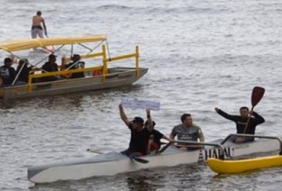
Posted on June 7, 2016
By Jenny Barchfield, The News Tribune
A leading Brazilian biologist who has fought for the cleanup of Rio de Janeiro’s polluted waterways called Saturday on interim President Michael Temer to release emergency funds to pay for the dredging of toxic lagoons hugging the Olympic Park.
Around 650 million Brazilian reais ($184 million) were earmarked for the project years ago but it was held up and has yet to begin.
Biologist Mario Moscatelli made the call during a seaside protest attended by surfers, sailors, rowers and other Rio residents.
Moscatelli is the most visible face of the fight to clean up the Olympic city’s waterways, which are polluted by human sewage. He also asked for a 10-minute meeting to discuss the release of the funds with Temer, who he says is the last hope for making good on long-postponed promises to clean up Rio’s waters before the Summer Olympics in August.
Rio is among the states hardest hit by the recession that’s slamming Brazil, and the funds for the project have dried up, Moscatelli said.
“It’s one more Olympic project that looks like it won’t become reality,” said Moscatelli, speaking in front on aerial photos showing massive brown sewage stains on Barra Beach. “If this project doesn’t happen before the games, it will never happen.”
Water pollution has become a hot-button issue in the lead up to Rio’s Aug. 5-21 Olympics. A massive cleanup was billed as one of the major legacy projects of the games, but an ongoing study commissioned by The Associated Press has shown the waterways where the Olympic rowers and sailors will compete are filled with illness-causing viruses and bacteria.
Rio’s mayor recently blasted the state for its failure to make good on the promises, calling it a “national shame.”
David Zee, an oceanography professor at Rio’s state university who attended Saturday’s protest, said the failure to dredge the Jacarepaga and Barra lagoons around the Olympic Park could prove catastrophic during the Games.
The high sewage levels fill the lagoons with sulfuric gas that is released during windy, agitated conditions, enveloping the area in a noxious smell that can harm people’s health. Zee said winds and big waves are common in August.
Moscatelli said that “whether we are embarrassed on a global scale will depend exclusively on Mother Nature.”
“If it’s windy and there are big waves, prepare your gas masks,” he said as demonstrators joined hands in a symbolic group hug along the canal where the lagoon’s brown waters empty into the Atlantic.
Source: The News Tribune





